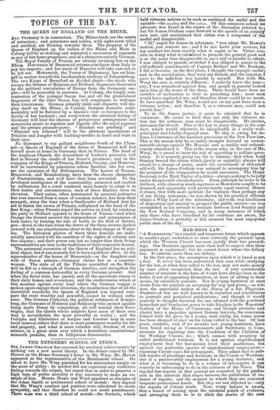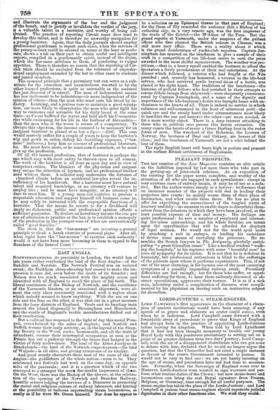BAR-MESS LAW.
"A BARRISTER," in a candid and temperate letter, which appears in another page, undertakes to state correctly the grounds upon which the 'Western Circuit bar-mess justify their late proceed- ings. Our Barrister appears more than half to suspect that their argument is sophistical; but he cannot detect where the fallacy lies. It contains more than one fallacy. In the first place, the assumption upon which it is based is not a fact. It never has been understood that men while studying for the bar, or when first called to the bar, may not make money by some other occupation than the law. A very considerable number of students in the Inns of Court have always been in the habit, if not of supporting themselves, at least of adding to their means, by subsidiary pursuits. Nor do young barristers at once desist from the practice on assuming the wig and gown,—as wit- ness the successful author of the Diary of a late Physician. Students of law are well known to be reporters and contributors to journals and periodical publications ; and though it would scarcely be thought decorous for one adorned with the powdered horse-hair and bombasine gown to take his place in the Reporters' Gallery of the House of Commons, and though attormes and clients have a prejudice against literary lawyers, the connexion formed with the press by a young man eating his terms never has been dropped at once on his being called to the bar. Of late years, students, and, if we mistake not, young barristers, have been found acting as Commissioners and Secretaries to Com- missions for inquiring into the Condition of the Children of the Working Classes, &c. ; which cannot with propriety- be called professional business. It is not against unprofessional employment that the bar-messes level their anathemas, but against one particular species of unprofessional employment- . reporting Circuit cases for newspapers. They admit that to pub. lids reports of pleadings and decisions in the Courts at Westmin- ster is a praiseworthy employment for a young barrister; and what it is becoming to do in a volume of law-reports it can scarcely be unbecoming to do in the columns of the Times. The regular law-reports in that journal are consulted by the profes, sion in the intervals that elapse between the publication of vo- lumes of reports; and the manner in which they are executed bespeaks professional hands. But they are not objected to—only the reports of Circuit trials. Now, every lawyer is aware, that a knack of seizing upon the essential points of evidence, and arranging them so as to elicit the merits of the case
awd Illustrate the arguments of the bar and the _judgment of the bench, and to justify er invalidate the verdict of the jury, is a valuable talent in a barrister, and worthy of being cul-
tivated-. The practice of reporting Circuit cases does tend to afevelop this talent, and is therefore no unworthy occupation for
n Tonne barrister. Again, that the daily journals should employ Vofessional gentlemen to report such cases, when the services of the penny-a-liner could be secured on terms at the least as mode- rate, shows a wish on their part to obtain useful and intelligent
reports, compiled in a gentlemanly spirit, instead of the desire, 'eh the bar-mess attribute to them, of pandering to vul r appetites. There is therefore no reason that the reporting of (Ar- Cult trials should be excluded from the tolerance of unprofes- sional employment extended by the bar in other cases to students and junior members.
• The assumed principle that a pecuniary test can serve as a sub- Stitute for the education and examinations resorted to by the other learned professions, is quite as untenable as the assumed fact just disposed of is unreal. The man of independent means has less incitement to be industrious—is more independent of the opinion of others—than the man who must earn his bread by in- dustry. Learning, and a jealous care to maintain a good reputa- tion, are more likely to characterize the man who must fight his way to eminence and scramble for his daily bread at the same
time—as Cwsar buffeted the waves and held aloft his Commenta- ries while swimming for his life in the harbour of Alexandria—
than the man who at the worst is secure of a competency. To obviate this objection, the income assumed to be necessary for an incipient barrister is placed at so low a figuzc-2501. This sum
would scarcely suffice for a couple of years to keep the barrister's V7ig and gown in order, defray his travelling expenses, (" bar- mess " inclusive,) keep him an courant of professional literature, &c. He must have more, or he must earn it somehow, or he must give up the profession.
Of all the learned professions, that of barrister is perhaps the one which may with most safety be thrown open to all corners. The work of the barrister is all done in open day and in view of Competent critics. The blunders of the physician and surgeon may escape the detection of laymen, and no professional brother
need witness them. A solicitor may undermine the fortunes of shundred clients before an accidental law-plea reveal the in- Sufficiency of his handiwork. But a barrister must have natural
talent and acquired knowledge, or no attorney will venture to employ him ; and he must have integrity, or no attorney will dare to trust him. If a young man can contrive to procure a respectable education and support himself till business come in, Ire may safely be intrusted with the responsible functions of a barrister. That the means he resorts to for a livelihood will
imply no dishonour, public and professional opinion affords a aufficient guarantee. To declare an hereditary income the sine gua non of admission to practice at the bar, is to establish a monopoly of the profession in the younger sons of what are conventionally called "good families." The truth is, that the " bar-messes " are inventing a general principle to cloak a harsh eiercise of personal pique. After all, what right have the " bar-messes " to exercise such authority? would it not have been more becoming in them to appeal to the Benchers of the Inns of Court ?



























 Previous page
Previous page